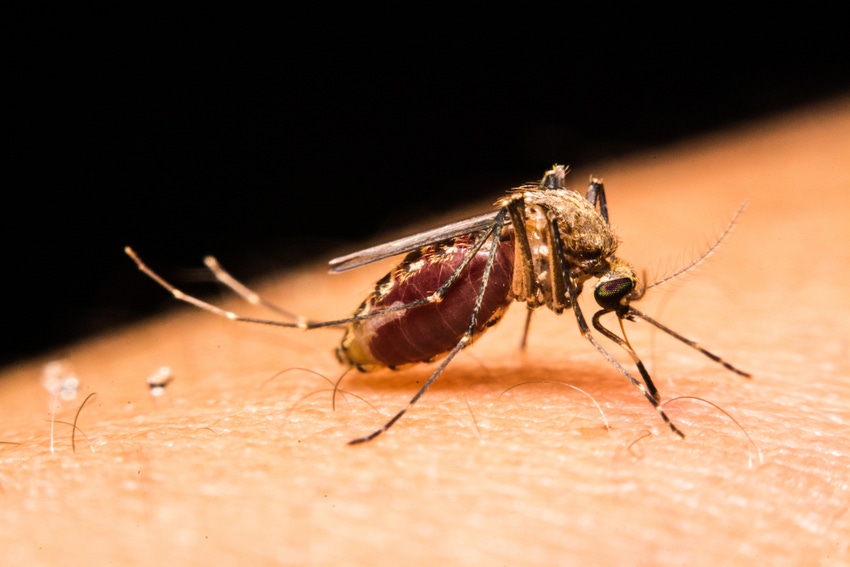
Farmers and ranchers are advised to perform a mosquito check around their properties to make certain they eliminate as many breeding conditions as possible, and further warned that when working outdoors, farm workers should dress to minimize skin exposure, and regularly apply a repellent containing DEET when mosquito activity is detected in a work area.

Our world is a place full of risk and danger. Every day we hear about numerous threats life and health.
Yet each morning most of us drink our coffee, crank up our engines and hit the road. After all, we must survive, and we carefully throw up barriers to keep us from dwelling on the negatives of life.
But does that mean we ignore the dangers, pretend the threat is not real?
Most psychologists seem to agree that is the normal human reaction. But the art of self-distraction may well present us with a serious dilemma. Unknown to most us, a real and deadly predator lurks quietly in the shadows of our back yards and alleyways, or hidden on the school grounds or at the tennis center and golf course and jogging trail.
Although these dangerous predators are small, almost microscopic, they number in the millions. Worse, they are probably responsible for bringing more death and damage to the human race than any other predator throughout human history. We call them mosquitoes, tiny, pestering dive bombers of misery that bite us furiously in their pursuit of fresh blood, the sole food source of their existence. The danger, of course, is not what they take from us, but what they leave behind.
Mosquitoes are carriers of disease, and their impact on the human population, past and present, is well documented. We once thought the days of uncontrolled outbreaks of deadly diseases like yellow fever were gone. But even in modern times, the disease—spread by mosquitoes—still claims an estimated 30,000 human lives each year.
STILL DEADLY
And that's not the only deadly disease spread by mosquitoes. Malaria remains a problem in many third world countries, as do dengue fever, West Nile Virus and West Nile Fever, and literally hundreds of other diseases commonly spread by marauding mosquitoes. One of the latest and more serious threats is the growing Zika virus outbreak worldwide, one of many viral hemorrhagic diseases that promises to plague humankind for years. According to researchers, the Zika virus could well be one of the worst pandemic outbreaks of the human race in generations.
Zika is technically an arthropod-borne flavivirus transmitted by mosquitoes. The virus is related to other flaviviruses including dengue, yellow fever virus, and West Nile virus. Clinical manifestations of Zika infection occur in approximately 20 percent of patients and include acute onset of low-grade fever with maculopapular pruritic rash, arthralgia, or conjunctivitis.
Neurotropism of Zika virus has been demonstrated in vivo and in vitro. And a Zika infection has been associated with neurologic complications, including congenital microcephaly (in addition to other developmental problems among babies born to women infected during pregnancy), Guillain-Barré syndrome, myelitis, and meningoencephalitis. Researchers now fear the virus may pose a serious risk to human populations around the world. Thanks to mosquitoes, rapid spread is possible.
INCREASED AWARENESS
While many of us turn a blind eye to the dangers that mosquitoes pose to human health, a growing number of medical researchers are becoming more aware of the disastrous potential mosquitoes pose in the modern world.
Last week (July 6, 2017), Discovery and Discovery Channels worldwide premiered a comprehensive, in-depth look at the risks posed by mosquitoes. Research used to develop the two-hour prime time special is helping to bring more awareness of the serious dangers we face.
Zika virus is named after the Ugandan forest where it was first isolated from a rhesus monkey in 1947. The first human cases were detected in 1952 in Uganda and Tanzania. The virus subsequently spread across equatorial Africa and Asia. The first major recognized outbreak occurred in the Yap Islands of Micronesia in 2007; more than 70 percent of the population under three years of age was infected, resulting in an estimated 5,000 infections among the total population of 6,700.
The stage had been set, the danger in the potential rapid spread of the disease discovered. Since then, in just over ten years, Zika virus has spread across the Pacific, into South American and the Caribbean Islands, and most recently into Central and North America. The Center for Disease Control is reporting that the latest numbers reveal that nationwide nearly 5,400 individuals were confirmed with Zika virus since first discovered two years ago. And worse, those numbers swell to 37,000 infected in the U.S. and its outlying territories.
SMALL NUMBERS EXPAND RAPIDLY
While this number is relatively small in relation to the population, researchers warn that epidemics start the same way as an avalanche. A pebble-size snowball grows quickly as it rolls down the mountain. In like principal, so does a viral epidemic.
Unlike some vectored diseases, no vaccine is currently available to prevent, or medicine to treat, Zika. Often, the carrier may not recognize he has been infected with the disease until it is passed to a child-bearing mother, who then passes it on to her offspring. Because of the disease's relationship with developing human organs, the effect is more rapid and widespread in infants and children.
In the end, the only real treatment for Zika is prevention.
For farmers and rancher—and all others who spend a great deal of time outdoors—eliminating mosquito breeding areas is the best defense against mosquitoes and all the diseases they are capable of spreading.
The use of a mosquito repellent containing DEET is the only known effective deterrent to avoiding contact with mosquitoes. That may change as researchers continue the fight to discover new technologies that may help curb the spread of the disease. But it's not the only thing researchers are looking at to help in the fight against mosquito-borne diseases.
SEARCH FOR REPELLANTS
For example, Mary Alice Scott, assistant professor of anthropology, and Immo Hansen, associate professor of biology in New Mexico State University’s College of Arts and Sciences have created an online survey to discover people’s homemade mosquito repellents.
The survey takes about five minutes to complete and is available at https://www.surveymonkey.com/r/6F3BHNH. To encourage participation, the researchers are offering $50 and $100 gift cards as prizes.
"This project aims to find techniques and strategies that people in different parts of the world use to protect themselves from mosquitoes," said Hansen.
She points to a study she conducted involving Victoria's Secret perfume. In her molecular Vector physiology laboratory she found the perfume out-performed commercial mosquito repellents more times than not. This was the catalyst for her to begin the search for undiscovered, homemade repellents.
"I’m a qualitative researcher, so the idea is that once we have a better sense of what’s out there, we would go to different places in the Americas and actually do more in depth interviews with people," Scott said.
Already the effort has revealed a few possible answers. For example, some cultures use a specific herb that is burned to keep mosquitoes away. But Scott is quick to point out that nothing so far has proven more effective than a good commercial repellent containing DEET.
Farmers and ranchers are advised to perform a mosquito check around their properties to make certain they eliminate as many breeding conditions as possible, and further warned that when working outdoors, farm workers should dress to minimize skin exposure, and regularly apply a repellent containing DEET when mosquito activity is detected in a work area.
About the Author(s)
You May Also Like





